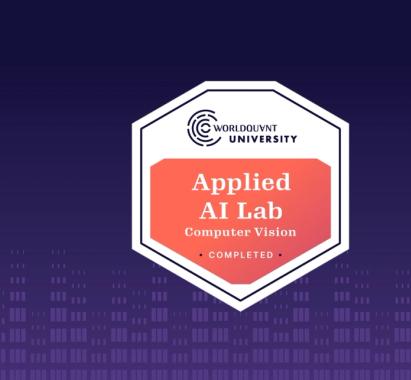Preparing for a Future in Financial Engineering

Are you interested in a future in financial engineering? Check out our post below for a deep dive on the skills needed for a successful career. To learn more about the field more generally, check out WorldQuant University's Guide to Financial Engineering.
Graduate from a MSc Program
Regardless of industry, to be a competitive applicant for financial engineering roles, candidates should first graduate from a dedicated Master of Science in Financial Engineering program. These degrees serve as a shorthand for employers, verifying that candidates have the proper skill set required for the role.
These graduate programs teach the core competencies of financial engineering, including mathematics, statistical analysis, economic modeling and forecasting, and much more. Most graduate student applicants have backgrounds in technical disciplines like engineering or computer science. However, it is possible to embark on a MSc (or MS) from a nontechnical undergraduate program, so long as students can still demonstrate the required technical skills, as well as differentiate themselves with additional skill sets.
Graduate programs also offer candidates an opportunity to connect with other students who wish to pursue similar careers. This community can result in beneficial networking opportunities, both immediately and following graduation, as your fellow alums mature in their careers.
Prove Mastery in Key Coding Languages
The majority of graduate degree programs will provide thorough lessons dedicated to each of the major coding languages used by financial engineers. Still, it is helpful for candidates to continually judge their own programming abilities against those already in-industry. The most popular languages leveraged by financial engineers include:
- Python: Python is a dynamic scripting language and is often used for statistical applications. The Python Software Foundation provides a comprehensive library of documentation and tutorials to help newcomers to the language learn its principles.
- Java: Java is a strictly typed, cross platform language that is often used by enterprises, due to its versatility. Oracle, which now owns Java, offers a tutorial that encompasses example code and practices for learners to leverage.
- C++: This is another strictly typed language. However, it is more low-level than Java and is therefore most frequently used for embedded systems. One of the most well-regarded resources for learning C++ is the LearnCpp website, which offers lessons that can help even complete beginners master the language.
- Scala: Like Java, Scala runs on Java Virtual Machine (JVM) and is strictly typed. It is interoperable with Java and is often used for big data processing. Scala itself offers robust reference materials and tutorials on how to best leverage and learn the language.
Beyond these language-specific learning resources, aspiriting financial engineers can also take advantage of more generalized programming learning platforms, like CodeAcademy, to improve their computer science skill sets. Additionally, there are a variety of Youtube channels that offer tutorials and overviews of almost any coding language one might encounter in the workforce.
Apply Theory to Data Science
It is important for aspiring financial engineers to be able to go above and beyond straightforward coding mastery. To complement their programming abilities, financial engineers should also be able to demonstrate higher level computer science skills, including advanced modeling and mathematics. Additionally, artificial intelligence has become an increasingly important technology for financial engineers as they seek to understand, model, and predict volatile financial markets.
To prepare for a successful future in financial engineering, candidates should practice deploying artificial intelligence methods and statistical theories to real world scenarios and unfolding global events.
Collaborate and Communicate Effectively
In addition to screening for the technical skills required of a financial engineer, employers and recruiters today increasingly make hiring decisions based on applicants’ so-called “soft skills.” In order to be successful as a financial engineer, candidates should seek educational institutions and work experiences that allow them to practice soft skills like collaboration, communication, and the ability to deliver results even in fast-paced environments.
As English is the global language of the financial industry, it is also important for aspiring financial engineers to demonstrate English proficiency. Those looking to improve their English should take advantage of the wide variety of free or low-cost language courses available online, from Duolingo to Rosetta Stone. It is also important to take advantage of the widespread availability of English-language media for a fuller and more authentic language immersion.
Demonstrate Ongoing, Real-time Knowledge of the Industry
Financial engineers work at the intersection of data science and the financial industry. For this reason, it is important for aspiring financial engineers to be well-read on market trends and current events regarding the world economy. Subscriptions to publications like The Financial Times, The Economist, and the Wall Street Journal all provide a solid foundation of news coverage and analysis that can be incorporated into financial predictions and modeling.
Is a Future in Financial Engineering Right for You?
At WorldQuant University, we believe that talent is equally distributed globally, but opportunity is not. It's why we created the world’s largest Financial Engineering graduate program, entirely free and completely online.
Designed by industry experts, our program addresses each of the skill sets mentioned above. WQU’s graduate program integrates mathematical, statistical, and computer science tools with finance theory in a completely online and collaborative setting. Graduates are positioned to excel in today’s highly collaborative and fast-paced professional environments.
The two-year program consists of nine graduate-level courses and a Capstone Course during which students complete a culminating project. Our students are career-driven, computer-savvy quantitative thinkers. They have fully completed a bachelor’s degree, demonstrated their proficiency in English, met the requisite technical skills, and are interested in a future in financial engineering.
To learn more about the program, or start your application, visit us at wqu.edu, or check out our video here.



